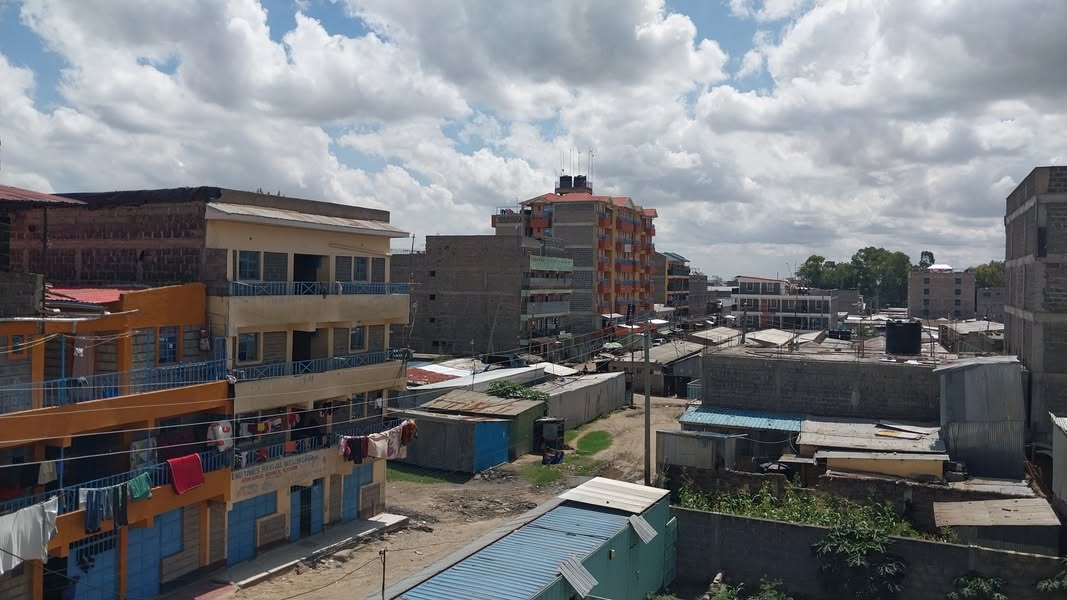
 Njuguini estate where Kenya Meat Commission has issued eviction notice to its residents in Mavoko, Machakos County on May 23, 2025.
Njuguini estate where Kenya Meat Commission has issued eviction notice to its residents in Mavoko, Machakos County on May 23, 2025.Over 600 homeowners and landlords in Mavoko, Machakos County, are appealing to the government to stop planned demolitions on land owned by the Kenya Meat Commission (KMC), urging authorities to instead regularise their plots.
The affected residents, who live in Njuguini and Slota estates within the Athi River subcounty, say they are open to dialogue with KMC to find a fair, lasting solution that will save their homes and investments.
Their call comes after KMC extended its eviction notice by 30 days from May 22, following the lapse of an initial 14-day notice issued earlier in the month.
“We are willing to negotiate for a win-win solution,” the residents said in a joint appeal.
“We request the government to consider regularising our plots instead of demolishing our homes.”
KMC confirmed the extension on Thursday, saying it was made after consultations with Machakos County officials.
The land in question — LR NO: 10281, Athi River — is owned by the commission and currently managed by the Kenya Defence Forces.
“This is to ensure that unlawful occupants are given enough time to vacate,” a KMC official told The Star on condition of anonymity, citing the sensitivity of the matter.
Mass Exodus and Economic Impact
When The Star visited the area on Friday, dozens of tenants were seen moving out, with many relocating to nearby towns, including Mlolongo, Kitengela, and Pipeline.
Residents expressed distrust in renting homes in Athi River, fearing more evictions on government land.
James Kalua, a long-time landlord in Njuguini, said the eviction notice has already taken a toll on property owners.
“I’ve lost more than half my tenants,” said Kalua, who constructed his first residential units on the land in 2005.
“This land was allocated to us by the defunct Mavoko Municipal Council. We are pleading for regularisation and issuance of title deeds.”
Homeowner Margaret Ndinda shared her distress, revealing that she is still servicing a bank loan for an unfinished mansion on a 50x100 metre plot.
“I’ve not even repaid half the loan. My businesses here have collapsed because people have moved out,” said Ndinda, who has lived in Njuguini for over 20 years.
“I don’t sleep. My children go to school on this same land.”
Fear, Stress, and Health Crises
Bonface Mwanzia, chairperson of the Njuguini Landlords Association, said the eviction threats have triggered serious mental and health challenges in the community.
“Some victims have been hospitalised due to shock and high blood pressure. Retirees who invested their life savings here are devastated,” he said.
Mwanzia estimated that more than 50,000 of the area’s roughly 200,000 residents have already fled.
The ripple effects are being felt across schools, churches, and small businesses.
“This is a thriving economy that’s now under threat. We have more than 600 developers, 20,000 school-going children, and about 50,000 employed residents,” he said.
“We’re not opposing the government — we’re asking for support. If the President wants affordable housing, we’ve already done our part as local investors.”
Call for Dialogue and Documentation
The developers are now calling on KMC, the County Government, and relevant ministries to sit at the table with local leaders and landowners to chart a way forward.
“We’re asking for regularisation of land ownership for those without title deeds, and structured agreements for those who already have them,” Mwanzia said.
“Let’s not demolish communities — let’s build a future together."











